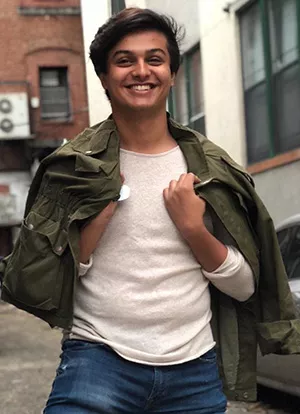Hussain Zaidi ’22 Awarded Newman Civic Fellowship

Hussain Zaidi ’22
Hussain Zaidi ’22 is a recent recipient of a Newman Civic Fellowship for his dedication to tackling societal issues by empowering the community. A biochemistry major from Lahore, Pakistan with a passion for medical anthropology and public health, Zaidi was recognized for his drive to confront social inequities using a variety of strategies, including education and activism.
Zaidi has a passion for ensuring opportunity for all, regardless of identity, which fuels him to develop community-driven solutions.
“No one should ever have to be afraid or face negative consequences as a result of the identity they choose to display,” says Zaidi. “I wish to see people educating themselves about these issues so that they can equip themselves with the knowledge to positively bring about progressive change, wherever they’re from.”
As a first-year student at Swarthmore, Zaidi has thrown himself into extracurricular activities that foster connections among community members and reduce social disparities. On campus, he is a tutor with Dare 2 Soar and a coordinator of Learning for Life.
His dedication also extends beyond Swarthmore to his home community in Pakistan. With the help of two friends back home, Zaidi developed a nonprofit organization, Pehchaan, which aims to provide the LGBTQ+ community in Pakistan with the tools they need.
“My project, Pehchaan, was the first youth-led attempt at assisting Pakistan's LGBTQ+—specifically transgender communities—who are discriminated [against] regularly as a result of the societal and religious stigma attached to their existence,” says Zaidi. “As someone who was always made fun of in school for being too excessively flamboyant as a result of not having a traditionally masculine personality, I wanted to take this project as a platform to educate people and advocate for individuals who are stigmatized against as a result of daring to be themselves.”
In a nomination letter of support, President Valerie Smith commended Zaidi’s outstanding dedication and leadership, both within and beyond the campus community.
“His work on and off campus illustrates a profound commitment to increasing equity and decreasing discrimination through a combination of education, advocacy, and public policy,” wrote Smith. “I view Hussain as a key player in the next generation of public problem-solvers and civic leaders—able to innovate and collaborate with key stakeholders.”
By participating in the Newman Civic Fellowship, Zaidi hopes to develop the skills to implement solutions to systemic problems. By learning from mentors and developing partnerships with other students, he hopes to gain greater insight into how to transform his ideas as an active citizen into a reality.
“I’m most excited about learning from and connecting with other students in the program, and possibly working with some of them, as well,” says Zaidi. “I have a lot of plans related to a variety of different sectors, like public policy and health, and I’m hoping that the skills I learn and bring home from the fellowship are used to actualize all these initiatives that I’m extremely excited about pursuing.”
The Newman Civic Fellowship was founded by Campus Compact, an organization of colleges that aims to empower students to be active and engaged citizens. The fellowship connects students to a network of other student leaders and provides hands-on and virtual trainings to carry out effective solutions for societal issues.



